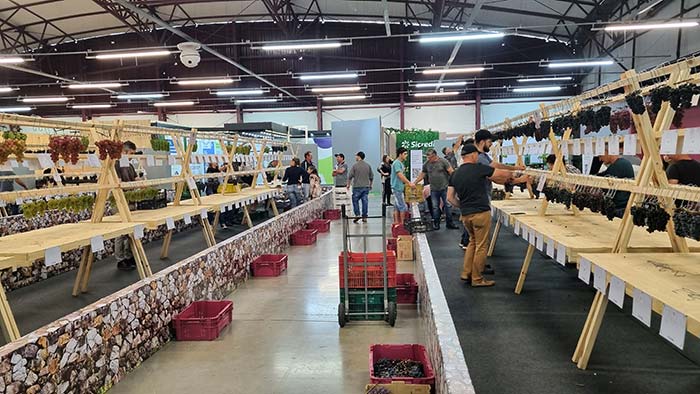A The 2024 Grape Festival took on a special shine this Wednesday (14.02) with the arrival of the grapes, the highlight of the event, at the Pavilions. During the morning, producers dedicated themselves to setting up the exhibition, which this year brings together 236 exhibitors, 594 fruit entries, covering 38 varieties and representatives from seven municipalities.
In the afternoon, a group of seven judges, including agronomist Paulo Dullius from SMAPA, carried out a blind evaluation of the grapes. The winners will be announced in the coming days, and an awards dinner is scheduled for the second weekend of the event.
Mayor Adiló Didomenico and the Festival’s Director of Agriculture, Rudimar Menegotto, made a point of following the assembly and talking to the producers, expressing gratitude and congratulations. Among the exhibitors, a highlight is the family of Celso Cechin, from Loreto da Segunda Légua, in Caxias, who participates with several generations and varieties of grapes, demonstrating the strong tradition and family pride in growing the fruit.
Love for the land
The cultivation of grapes in Serra Gaúcha by the descendants of Italian immigrants is a vivid portrait of the fusion between tradition and innovation, preserving a legacy that goes beyond agriculture. When Italian immigrants settled in this region of Brazil in the late 19th century, they brought with them not only vines, but also an invaluable piece of their culture, rooted in a love of the land and the art of winemaking.

This tradition of grape growing and wine production has become a vital link between the past and the present, a symbol of the resistance and adaptation of these communities. Every vine planted and every bottle produced is a testament to the resilience and determination of these immigrants to preserve their cultural roots in a new world. More than an economic activity, viticulture in Serra Gaúcha is an expression of identity and belonging, a bridge between generations that transmits values, stories and a deep sense of community.
In addition to being a strong reference for the region, grape cultivation and wine production in Serra Gaúcha also play a fundamental role in maintaining Italian traditions, from language and customs to gastronomy. Festivals such as the Grape Festival celebrate this heritage, uniting people around the appreciation of the fruit and its transformation into wine, an almost magical process that symbolizes the connection with the land and the celebration of life.







